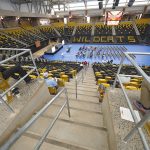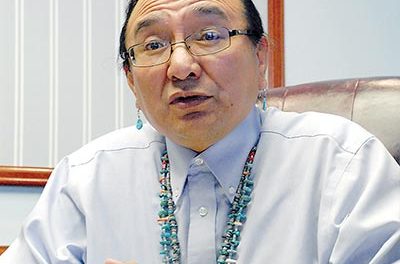
Crotty drops emergency bill for Hardship payments
WINDOW ROCK
In a bold move, last Friday Delegate Amber Kanazbah Crotty dropped an emergency bill that would allocate $207 million of ARPA Fiscal Recovery Funds to provide a second round Hardship Assistance payments to the Navajo people.
“The Hardship can’t wait,” Crotty told Navajo Times. “ARPA was signed in March. We got the money in May. The people need relief.”
Crotty’s bill essentially peels off the Hardship proposal from the executive branch ARPA bill that would allocate $1.16 billion for infrastructure projects, including water ($301 million), electricity ($200 million), broadband ($208 million), housing ($100 million), and bathrooms ($150 million), plus hardship assistance ($207 million).
This comes on the heels of another Naabik’íyáti’ two-day work session with the executive branch to review its proposal (No. 257-21) that once again left the status of the bill up in the air amid numerous unanswered questions and concerns raised by delegates.
“It has been 283 days since President Joe Biden signed into law the American Rescue Plan Act,” said Crotty. “The Navajo people need immediate assistance now during this pandemic and the Navajo government must meet their requests.”
Crotty said hearing from constituents who are in different, unique situations, the similar thread that runs through is that COVID is still impacting Diné communities.
“Navajo leaders continue to hear directly from people who are displaced, suffering and vulnerable,” said Crotty. “Our intention for this emergency legislation is to provide direct winter relief to families to pay for water and electric bills, groceries, and more.”
Since last year at this time, the numbers have doubled in terms of losses to COVID-19, she said, and others are still suffering from long COVID symptoms.
“COVID is still here and creating chaos in families,” said Crotty. “There’s still a strong need to help at a every individual, household level and this funding allows for that. I know it’s a challenge, because we also need infrastructure, but we need to make sure that our people have a sound well-being.”
‘Financial devastation’
In a press release on Sunday, Speaker Seth Damon thanked Crotty for her “advocacy and leadership” by introducing emergency legislation to address the “urgent needs of the Navajo people.”
Her bill states that the “financial devastation” on the Navajo people by the COVID-19 pandemic “has risen to emergency levels,” which makes it vital that they be provided “immediate financial assistance.”
According to the speaker’s office, the emergency bill will likely be considered in a special session next week, after the Christmas holiday.
“It is in the best interest of the Navajo people to enact the (Hardship Assistance plan) … to counteract limited access to direct services necessary to recover from the devastation cause by the COVID-19 pandemic and mitigate exposure to future variants,” states the bill.
Crotty said a recent national survey reported that 72% of Native Americans are feeling mental health distress when it comes to COVID, which also needs attention.
She said the federal government specifically provides for the Navajo ARPA funds to directly help Navajo households.
“This money must be used to assist our communities’ recovery,” she said. “A second allocation of Hardship Assistance payments directly to our families will allow them to purchase critical winter supplies like gasoline, firewood, and food.”
According to the ARPA, funds are specifically intended to respond to the COVID-19 public health emergency and its negative economic impacts, provide premium pay to eligible frontline workers, provide government services to disproportionately impacted communities and make necessary investments in infrastructure that protects people from the impacts of COVID-19, such as running water.
Costs for ARPA projects and services must be incurred or obligated by Dec. 31, 2024, and projects must be completed by Dec. 31, 2026.
Crotty said if her bill passes, individuals who applied for the CARES Act Hardship program will not have to reapply and check disbursements will follow the financial process previously approved by the controller’s office.
“If they’re in the system, they are automatically eligible to receive future funding that’s being allocated through the Council,” she said.
Those individuals who have yet to apply for assistance will be able to do so through the OOC online portal, the speaker’s office said.
“Our people have been through a lot the last two years and they need our immediate help,” said Delegate Eugene Tso. “These Hardship Assistance payments are long overdue and the Navajo Nation Council must take action to help our grandmas and grandpas, and our most vulnerable families.”
Tso said this issue is no longer debatable because communities are suffering now.
“As Navajo leaders it is our responsibility to assist our people,” he said.
‘A comprehensive approach’
In August, the Navajo Nation Council approved a resolution (No. CYJ-41-21) that set a 10% cap on Hardship Assistance, which amounts to $207 million, but Crotty’s bill could be amended to waive the cap and increase the amount.
In fact, that is likely to happen since delegates such as Eugenia Charles-Newton and Vince James have been advocating for larger payments for months.
The $207 million would provide approximately $600 per person.
On Saturday, the Northern Agency Council unanimously approved a resolution supporting Crotty’s bill and recommended increasing the allocation of $207 million to $621 million, which would triple the amount paid to each individual.
Crotty said while the $207 million for hardship was a good starting point, it never should have been considered the only amount provided over the life of ARPA funding.
The issue facing delegates is that if hardship is increased, then funds for ARPA projects would decrease.
However, Crotty said there is an additional $622 million “non-FRF” ARPA funding (in addition to the $2 billion) that is coming down separately to different Navajo Nation programs, which can support some funding needs.
For example, the Navajo Housing Authority and the Division of Social Services have received funds to provide immediate rental assistance for college students, single parents, and elders.
Crotty said it is also still unclear what projects included in the executive branch bill could be funded through other sources, such as the Indian Health Service, the Biden administration’s new infrastructure bill, or the Build Back Better Act.
“This is why it’s so important for delegates to know the totality of what’s coming down the pipeline,” said Crotty.
While Crotty said last week’s work session was the first time delegates got more detail about what is included in the executive branch proposal, they still need more information and a comprehensive plan that includes explanation of how the bill specifically addresses COVID-19 response as well as timelines for completion of projects and services.
She said delegates learned that some of the projects would take two years to even get off the ground.
“That doesn’t look acceptable,” she said.
“I’m asking questions, and I’m still not getting answers,” said Crotty. “I think we’ve given enough grace time to the different programs to provide a way to streamline the projects, but we’re just not there yet. The people should not suffer while the system tries to catch up.”
Crotty said delegates weren’t invited to be part of the conversation on the executive branch plan, although Speaker Seth Damon was involved.
“This is really the executive’s plan and there’s nothing from judicial,” she said.
Public safety is missing and the public health COVID response and Hardship payments should be at the forefront, she said.
“We need a comprehensive approach,” she said. “That’s where we’re at and that’s the frustration and that’s why I think there needs to be more shared discussion.”
In the meantime, Crotty said the Navajo Nation Council appreciates all of the community health representatives, senior center staff, and public health officials who are on the frontlines fighting the pandemic.
If Crotty’s bill is approved by the Navajo Nation Council’s special session next week, Speaker Seth Damon has 10 days to certify the legislation then President Jonathan Nez has 10 days to approve or veto the bill.
Crotty is encouraging people to comment on the bill, which can be viewed at http://dibb.nnols.org/publicreporting.aspx
“Comment periods are open during the life of the legislation until final action is taken,” said Crotty. “The public can comment anytime.”
As a public service, the Navajo Times is making all coverage of the coronavirus pandemic fully available on its website. Please support the Times by subscribing.
How to protect yourself and others.
Why masks work. Which masks are best.
Resources for coronavirus assistance







 Highway 264,
Highway 264, I-40, WB @ Winslow
I-40, WB @ Winslow